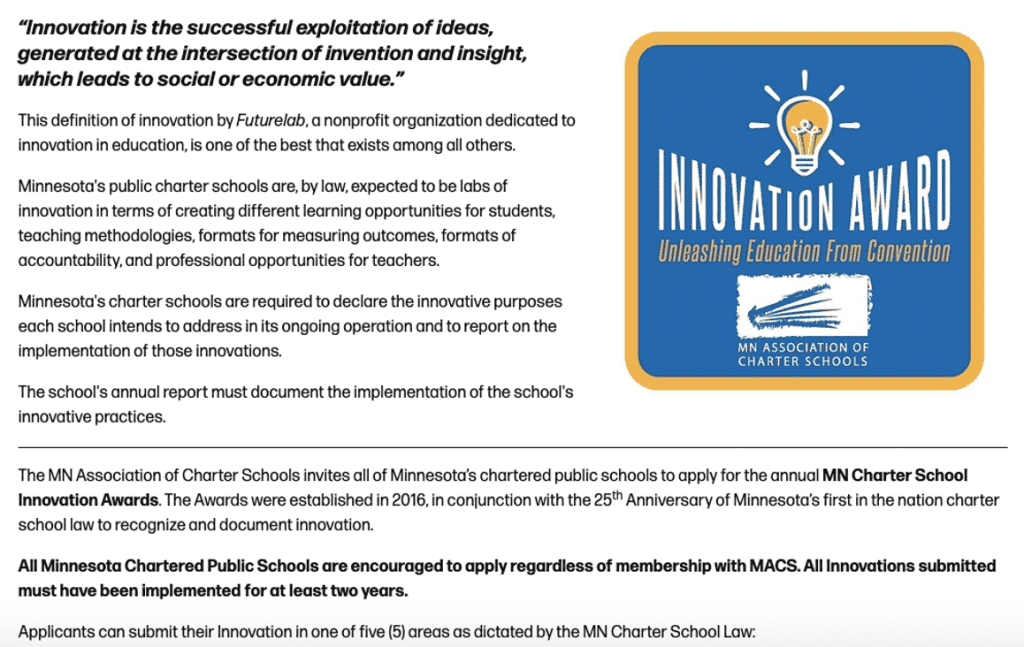Written by Joe Nathan | Published by CharterFolk
Good day, CharterFolk.
Today we are delighted to share a Contributor Column from Joe Nathan, Founder and Co-Director of the Center for School Change. I provide below a picture and a bio for Joe that is customized to the purpose of today’s column.

Eugene Piccolo (Center) with former Democratic State Legislator and former district teacher Linda Slocum and Joe Nathan
The following was written by Joe Nathan, founder in 1988 and co-director, Center for School Change. Nathan helped write the nation’s first chartered public-school law in Minnesota. Governors and legislators in 30+ states asked him to help write and/or refine their legislation. He’s been an urban public-school teacher, administrator, and PTA parent. He’s written several books, including Charter Schools: Creating Hope and Opportunity in American Education. He worked with Eugene Piccolo for more than 20 years.
Significant State Level Success & Lessons from Minnesota’s Gene Piccolo
Eugene Piccolo, Executive Director of the Minnesota Association of Charter Schools for 18 years, had a huge positive impact on hundreds of thousands of Minnesotans. His legislative success offers several lessons for educators, policymakers, and funders. Piccolo passed away earlier on February 6, just two months after retiring.
Before describing Piccolo, it’s worth briefly summarizing the law he helped shape. Minnesota has adopted with bi-partisan support, legislation that, among other things:
- Allows an unlimited number of charter public schools to open and operate.
- Provides $100+ million per year to help pay for buildings, separate from the state-wide per pupil funding of charters. Also, charters and district public schools receive the same statewide per-pupil funding.
- Funds charters directly from the state, rather than having to go through local school boards.
- Permits a number of organizations to authorize chartered public schools.
- Requires a yearly financial audit and annual performance report, both of which must be readily available to the public.
- Provides millions of dollars/year to help serve students with special needs, in addition to the state per pupil funding.
- Requires charters to be open to all, with no admissions tests.
Here are several lessons that people might consider:
1. Piccolo was first and foremost an advocate for students and families – all students, all families.
Former Minnesota Commissioner of Education, Mary Cathryn Ricker told me that “Eugene was a tremendous champion for children.” Ricker formerly was the president of the St Paul Federation of Teachers, and later, Executive Vice President of the American Federation of Teachers. Yet she and many others recognized his constant advocacy not just for chartering, and for chartered public schools, but for all youngsters.
2. Piccolo readily acknowledged that some charters were not well run, that Minnesota’s charter legislation should be refined periodically to increase accountability and transparency and that not all improvements require more money.
As Darius Husain, former MACS board chair and director of Face to Face Academy wrote: “While a champion for charter schools, his advocacy did not come without expectation. Eugene challenged leaders to effectively govern and implement the best version of their schools.”
Current MDE Commissioner Willie Jett agreed, describing Piccolo as “a champion of charter school standards and accountability.” Jett added, “His passion for education has left a positive impact on all who knew him.”
Legislators of both parties listened to and worked closely with Piccolo because he acknowledged problems and suggested practical solutions.
Representative Carlos Mariani, an urban Democrat, was sad to learn of Eugene’s passing and recalled that they “had worked together to increase standards and accountability.”
For example, when critics complained that the state law did not require charter principals or directors to be licensed, Piccolo helped legislators modify the law so that all non-licensed principals or directors were required to work with their boards to develop a yearly learning plan for themselves. This was far more useful for many than earning a degree at some administrator preparation programs that are not focused on key responsibilities of charter leaders.
Piccolo’s willingness to suggest legislative improvements that did not always require more money was one of many reasons legislators of both parties respected and accepted many of his suggestions.
The importance of acknowledging mistakes and offering constructive, practical legislative remedies remains one of his most important legacies.
Piccolo embraced the truth of the slide below from Dr. Don Shalvey’s 2014 presentation at a Minnesota Charter School conference.

3. Piccolo stressed the importance of honoring, promoting and sharing innovation.
Piccolo worked with local funders to establish a yearly award program that recognized innovation. He constantly promoted the idea that chartering – a verb – allows innovation and he stressed that, from the very beginning, fostering innovation has been one of the central reasons for chartering. Here’s more informationabout how innovation has been a deeply shared value of the Minnesota charter sector of public education.


4. Eugene was, in the words of Jennifer Godinez, former Deputy Director of Minnesota Education Equity Partnership, “a champion of racial equity and so supportive of diverse voices being in the room to shape education policy.”
He constantly reached out, encouraging families, students, and others to share their insights. Khalique Rogers, co-director of the Center for School Change, recalled that Piccolo insisted on listening to and learning from diverse voices, including students and families. This is part of the reason why Minnesota charters have grown exponentially, and serve a more diverse population than district schools in Minneapolis, St Paul and throughout the state.
5. Piccolo stressed the Importance of understanding and remembering our history.
He wrote more than 40 brief blogs describing the history of chartering in Minnesota.

These are immensely valuable for new staff, board members and students.
6. Piccolo took the work, but not himself, very seriously.
In fact, he demanded the MACS board and staff promise not to say or do anything special about him at his last annual MACS meeting, held in December 2023. Linda Slocum, a MACS Board member, and former Minnesota House of Representatives member who worked with Eugene to help revise Minnesota charter school laws to increase transparency and accountability. She told me, “I adored Eugene because of his grasp of education law, his willingness to mentor me and his humility.” Jeanne Allen, executive director at Center for Education Reform, based in Washington, D.C., recalled: “Eugene was a relentless and devoted champion for positive change in education, a guy who never thought about himself and always worked to build new alliances to get the work done, no matter what conventions he broke.”
Many people recognized Piccolo’s openness. Beth Topoluk, executive director of Friends of Education, wrote that she and Piccolo sometimes disagreed vigorously but that he was “a passionate advocate who never held anything back but who always respected others.” Nina Rees, recently retired director of the National Alliance for Public Charters, recalled “He was one of the few to push me/NAPCS to think differently and more aggressively about our role as a national convener. We may not have agreed at all times, but Eugene was always respectful and authentic.”
Here’s a link to what many others said about him.
7. Finally, Piccolo prepared many others to lead.
I agree with Jed Wallace’s conclusion: “Eugene’s legacy is tens of thousands of Minnesota students having received better educations than they otherwise would have and a community of schools in Minnesota poised to have even greater impact in the years to come.”

